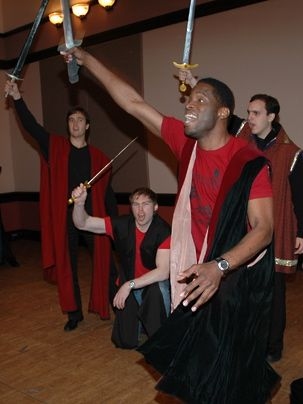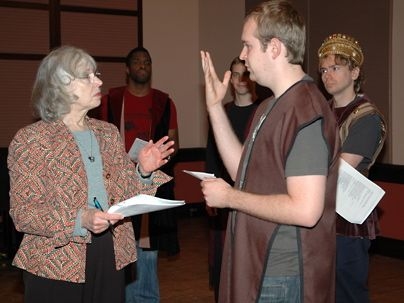The head surgeon (played by Vic Malla) hands a scalpel to a first-year medical student with a startling command: Start cutting on the patient. The student (played by Jean Ng) decides this isn't a good idea and snaps out a response to deflect the direct order: "You want me to operate on George Clooney?" The surgeon, just as quickly, replies: "George Clooney would want you to operate."
As the MBA students dissolved into laughter while watching the improvised scene--an exercise in the Sloan Innovation Period workshop "Improvisation and Influence: An Experiential Leadership Lab"--a valuable lesson is highlighted. Quick thinking, a grasp of details and subtle manipulation of status can be invaluable tools in the business world.
"Virtually every discipline has within it improvisation," actress and consultant Daena Giardella told the SIP class. "Great leaders are master improvisers; they respond to the situation."
Meanwhile, across campus, other Sloan students are wielding swords and calling on "We few, we happy few, we band of brothers" for the SIP class, "Leadership as Acting," in which Sloan senior lecturer Christine Kelly leads students through a shortened version of Shakespeare's "Henry V."
These two SIP classes, held during the October 2007 session, may seem more suited for Broadway than the boardroom but both underscore the message that leadership requires multiple skills--skills that can be taught and practiced.
In Kelly's class, for example, participants improved their speaking and presentation styles while considering the management techniques of the boy king of England. In the play, Henry V uses threats, guile, charm and inspiration to get what he wants--whether victory on the battlefield or the heart of a French princess. A number of students played his role, giving each a taste of being the king. Putting on the play is not just a chance to be on stage, it's "more what you learn about yourselves as leaders," Kelly said.
In one scene, for example, Henry threatens a French mayor with hideous mayhem if he doesn't capitulate. "It's an example of a leader using fierce words to get what he wants," Kelly noted. In another scene, Henry is reflective, somber and worried; in another he is flirtatious, using his rough and plain style to his wooing advantage.
Indeed, influence has become a key skill in the global marketplace, where top-down, my-way-or-the-highway relationships are in flux and leaders need to subtly shift language, tone and body stance with subordinates or partners, noted Deborah Slobodnik, a co-founder of Options for Change and a co-teacher in the improvisation class. She and Giardella challenged their students through skits and exercises to examine their own style of influence--their "default" setting--and adopt new styles: "You need to be able to pivot," Giardella said.
Some of the exercises seemed silly at first: Emi Fong had to sing a ditty about her shirt, while Alex Prieux had to play an alien journalist describing a human house. But the humor, quick response and actions helped students "straddle the moment."
Other exercises forced students to improvise on what others said or did: Prieux and Trip Bellard argued heatedly about imaginary owed money; David Gold played a calming therapist to a distraught Prieux; Kabir Goyal convinced a skeptical Catherine Ma to climb into a sewer. "We are so caught into what we want the other person to think or feel, we plow over the clues" offered by the other person, Giardella said.
In an intense exercise, students were asked to describe their "inner critic" and pretend to kick it around. After first holding back, Alejandra Santamaria smashed her inner naysayer with improvised karate moves. We never really lose that internal critic, Giardella said, but we can use the inner demon to our advantage. "You can master its energy and use it for your own purposes," she said.
"Leadership is an emotional expression," said Taariq Lewis, who enthusiastically dove into the nuances of playing the young commander in "Henry V." "In this class, we remember how to be open and honest and emotional. I'm trying to be a better leader by learning how to be emotionally charged but still corporate."
A version of this article appeared in MIT Tech Talk on November 14, 2007 (download PDF).







